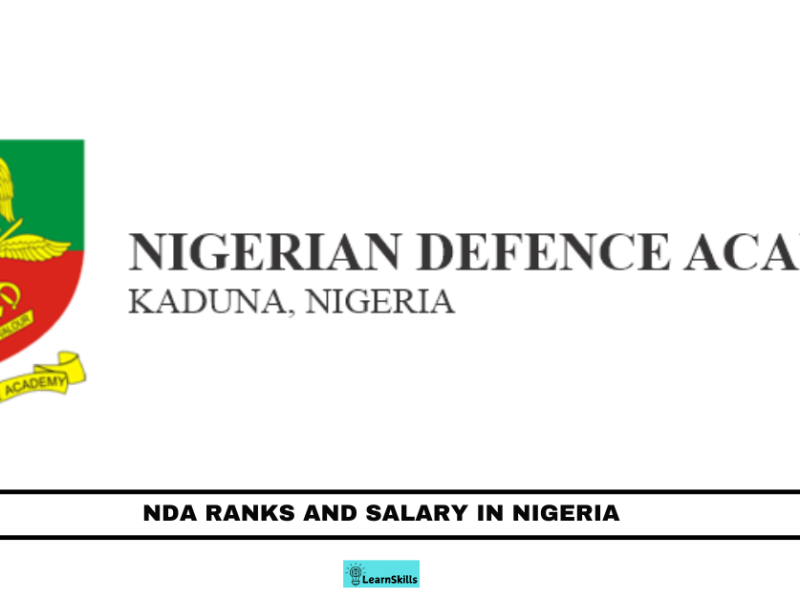The Nigerian Defence Academy (NDA) plays a crucial role in shaping future leaders of the Nigerian Military. Graduates from the NDA can enter various branches, including the Nigerian Army, Navy, and Air Force.
Knowing the ranks and salary structure of the Nigerian Military can give you valuable insight into a potential career path and the benefits it offers.
In the Nigerian Army, for example, salaries vary greatly depending on the rank you achieve. For instance, a Major General can earn around N950,000 monthly, while a Private Soldier starts at about N49,000.
The salary structure in the Nigerian Military reflects not only the responsibilities that come with each rank but also the commitment required.
Whether you aim for a leadership role or start at the entry-level, each position offers unique opportunities and rewards worth considering as you navigate your career options in the armed forces.
Overview of the Nigerian Defence Academy
The Nigerian Defence Academy (NDA) plays a vital role in shaping the future leaders of the Nigerian Armed Forces. It focuses on military education, training, and the overall development of cadets.
Mission and Training
The primary mission of the NDA is to train cadets for leadership roles in the Nigerian Armed Forces. You will find that the academy emphasizes military discipline, physical fitness, and academic excellence.
Cadets undergo rigorous training programs that include:
- Military Tactics: You will learn essential skills related to strategic planning and combat.
- Physical Training: This includes exercises to build strength and endurance.
- Leadership Development: Focus is placed on making decisions under pressure.
Training combines classroom learning with practical experience to prepare cadets for real-world military challenges.
History and Evolution
The NDA was established in 1964 in Kaduna, Nigeria. Initially, it served to provide military training similar to that of other global military academies. Over the years, it has evolved to meet the changing needs of the Nigerian military.
In 1985, NDA began a full academic program, granting undergraduate degrees in various fields. This shift aimed to provide cadets with a well-rounded education.
Today, the NDA offers courses in:
- Engineering
- Social Sciences
- Military Studies
These programs ensure that graduates are not only competent military leaders but also well-informed citizens. The institute plays a crucial role in the recruitment and training of officers for Nigeria’s defense forces.
Hierarchy of Nigerian Military Ranks
The Nigerian military has a structured hierarchy that includes ranks for both commissioned and non-commissioned officers. Understanding these ranks is essential for recognizing the roles and responsibilities within the forces.
Commissioned Officers
Commissioned officers hold significant authority and responsibility. They typically start their careers at ranks such as Pilot Officer and can advance to high ranks like Air Chief Marshal.
The ranks include:
- Pilot Officer
- Flying Officer
- Flight Lieutenant
- Squadron Leader
- Wing Commander
- Group Captain
- Air Commodore
- Air Vice-Marshal
- Air Marshal
- Air Chief Marshal
- Marshal of the Nigerian Air Force
As a commissioned officer, you may lead troops and develop strategies. The rank attained often reflects your level of experience and leadership capabilities.
Non-Commissioned Officers
Non-commissioned officers (NCOs) are crucial for daily operations and executing commands from commissioned officers. They begin as Recruits and can rise to ranks like Warrant Officer.
Common ranks include:
- Corporal
- Lance Corporal
- Sergeant
- Warrant Officer
- Master Warrant Officer
NCOs serve as a link between enlisted personnel and commissioned officers. They train troops and manage day-to-day activities within their units. Their leadership is vital in maintaining discipline and effectiveness.
Nigerian Army Rank Structure and Responsibilities
The Nigerian Army has a clear rank structure that separates personnel into two main categories: Non-Commissioned Officers (NCOs) and Commissioned Officers.
Non-Commissioned Officer Duties
Non-Commissioned Officers play a vital role in maintaining order and discipline in the Nigerian Army. They usually include ranks such as Corporal, Sergeant, and Warrant Officer.
Responsibilities of NCOs include:
- Leading soldiers in daily tasks and ensuring their welfare.
- Training and mentoring junior soldiers to develop their skills.
- Enforcing discipline and Army regulations among troops.
- Assisting officers in planning and executing missions.
NCOs act as a bridge between the enlisted soldiers and the Commissioned Officers. Their hands-on experience is essential for mission success.
Commissioned Officer Duties
Commissioned Officers hold higher ranks like Lieutenant, Captain, and Colonel. They are responsible for strategic planning and decision-making.
Key duties of Commissioned Officers are:
- Directing operations and managing units effectively.
- Developing training programs to enhance soldier capabilities.
- Representing the Army in meetings and official functions.
- Ensuring the well-being and morale of their subordinates.
These officers play a critical role in shaping the Army’s future and ensuring overall mission success. Their leadership is key to the effectiveness of the Nigerian Army.
Nigerian Navy and Air Force Rank Structure
The Nigerian Navy and Air Force have distinct ranks and structures, essential for understanding military organization.
Nigerian Navy Ranks and Roles
The Nigerian Navy has a structured rank system that includes several ranks, with each rank having specific duties.
Here is a brief overview:
- Admiral: The highest rank, responsible for major naval operations.
- Rear Admiral: Oversees naval fleets and strategic planning.
- Commodore: Commands naval bases and significant operations.
- Captain: Leads ships and directs operations onboard.
- Commander: Responsible for smaller vessels or specific missions.
- Warrant Officer: Senior non-commissioned officers providing support.
Salaries vary based on rank. For example, a Rear Admiral earns approximately N1,003,245 monthly, while a Captain makes about N309,654.
Nigerian Air Force Hierarchy
The Nigerian Air Force has its own ranks and structure, which are crucial for air defense. Some key ranks include:
- Air Chief Marshal: The highest rank, managing overall air operations.
- Air Marshal: Senior officers who oversee significant operational areas.
- Group Captain: Leads specific squadrons.
- Flight Sergeant: A senior non-commissioned officer, facilitating crew management and training.
- Air Warrant Officer: Offers specialized skills and supports operations directly.
Rank influences salary, with an Air Warrant Officer earning about N171,793 monthly and a Flight Sergeant earning a salary based on experience and role in operations.
NDA Ranks and Salary Structure
The Nigerian Defence Academy (NDA) trains officers for the armed forces. Understanding the ranks and salary structure is important for prospective cadets.
Here is a basic outline of ranks and their approximate monthly salaries:
| Rank | Monthly Salary (Naira) |
|---|---|
| Recruit | ₦53,308.42 |
| Private Soldier | ₦49,000 |
| Lance Corporal | ₦55,000 |
| Corporal | ₦62,000 |
| Sergeant | ₦70,000 |
| Lieutenant | ₦120,000 |
| Captain | ₦150,000 |
| Major | ₦190,000 |
| Lieutenant Colonel | ₦210,000 |
| Colonel | ₦250,000 |
| Brigadier | ₦300,000 |
As you progress in rank, your salary increases significantly. The salaries reflect the responsibilities and duties associated with each rank.
In addition to salaries, officers may receive benefits such as housing, medical care, and allowances.
Staying informed about the salary structure can help you plan your career in the military. Each rank carries its own prestige and set of challenges, making it crucial to choose your path wisely.










